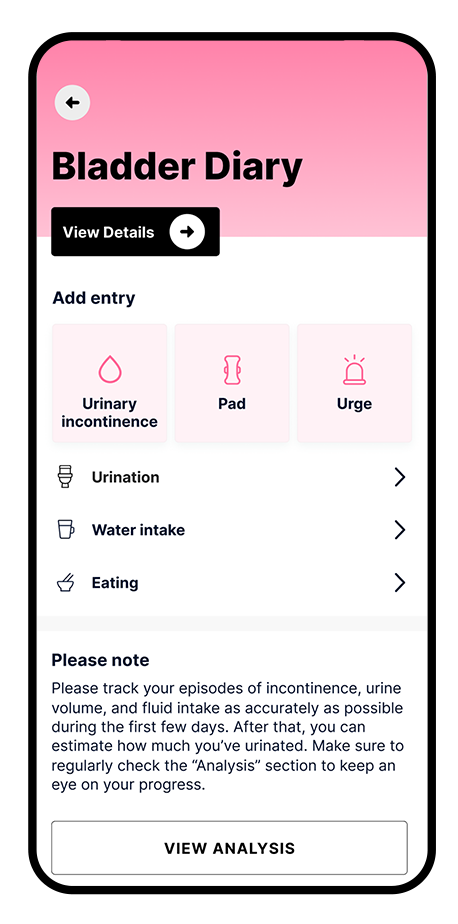Kranus Mictera -
One therapy for all types of incontinence.
The only therapy for women at every stage of life – flexible, empowering, and available anytime. No devices, no waiting times, no side effects.
More than pelvic floor training.
With the digital therapy program from Kranus Mictera, symptoms such as frequent urge to urinate, increased urination, and urinary incontinence can be specifically addressed – helping you achieve significant relief from your symptoms.
Clinical results that set new standards.
92% of patients showed an improvement in their symptoms.
The DINKS study*, a randomized controlled trial (RCT) with evidence level Ib, confirms the effectiveness of Kranus Mictera. The study was conducted by Prof. Dr. med. Alex Haferkamp (University Hospital Mainz) and included 194 participants.
Control group
Intervention group
* Analyses in the FAS using J2R imputation**
Scientifically based
No costs for patients in Germany
Combinable with medication
Safe and certified
Developed and recommended by doctors and medical experts.
What our patients say about Kranus Mictera.
Frequently Asked Questions.
-
Female urinary incontinence refers to the involuntary loss of urine in women. It is a common condition that can range from occasional mild leakage to frequent and severe episodes. Around 25% of women worldwide are affected by urinary incontinence. There are several types of urinary incontinence in women:
Stress Incontinence: This occurs when urine leaks during activities that increase pressure in the lower abdomen, such as coughing, sneezing, laughing, or lifting heavy objects.
Urgency Incontinence: Also known as overactive bladder, this form involves a sudden and intense urge to urinate, followed by involuntary urine loss.
Mixed Incontinence: This is a combination of stress and urgency incontinence symptoms.
Several factors can contribute to the development of urinary incontinence in women, including childbirth, menopause, pelvic floor weakness, recurrent urinary tract infections, certain medications, and neurological disorders.
Treatment options for female urinary incontinence include pelvic floor exercises (Kegel exercises), behavioral therapies, medications, medical devices, and surgical interventions. The appropriate treatment depends on the type and severity of the incontinence, as well as the overall health and preferences of the affected individual.
-
Yes, pelvic floor muscle training is a key component of the therapy program and should ideally be done before childbirth. Studies show that pelvic floor exercises before and during pregnancy can significantly reduce the risk of urinary incontinence (bladder weakness) later in pregnancy and after childbirth. Pelvic floor exercises are especially effective when done under guidance. The 12-week Kranus Mictera therapy program helps you effectively integrate these important exercises into your daily routine.
-
Yes, pelvic floor muscle training is a central part of the therapy program and is crucial for women after childbirth. Studies show that regular pelvic floor exercises can effectively reduce urinary incontinence (bladder weakness) after delivery and promote the recovery of pelvic floor muscles. The effectiveness of the program is particularly high when done specifically and under guidance. The 12-week Kranus Mictera therapy program helps you integrate these important exercises step by step into your daily routine, allowing you to benefit from them in the long term.
Stress incontinence: This occurs when activities that increase abdominal pressure, such as coughing, sneezing, laughing, or lifting heavy objects, cause urine leakage.
Urge incontinence: Also known as overactive bladder, this form is characterized by a sudden and strong urge to urinate, followed by involuntary urine leakage.
Mixed incontinence: This is a combination of stress and urge incontinence symptoms.
Several factors can contribute to the development of urinary incontinence in women, including childbirth, menopause, pelvic floor weakness, recurrent urinary tract infections, certain medications, and neurological disorders.
Treatment options for female urinary incontinence include pelvic floor exercises (Kegel exercises), behavioral therapies, medications, medical devices, and surgical interventions. The appropriate treatment depends on the type and severity of incontinence, as well as the overall health and preferences of the individual.
-
Yes, the Kranus Mictera therapy program is a valuable complement to pelvic floor exercises. A clinical study has shown that even women who have already completed pelvic floor training or postnatal courses in the last six months can benefit from this program.
Kranus Mictera is based on a multimodal concept. In addition to targeted pelvic floor exercises, it includes bladder training, educational content, and mental exercises. This combination makes the program particularly effective and allows for seamless integration into daily life.
The effectiveness of Kranus Mictera demonstrates that it can be used not only as an independent therapy but also in addition to existing exercises. This offers women the opportunity to work comprehensively and sustainably on their health and well-being.
-
Yes, the Kranus Mictera therapy program is an ideal complement to a postnatal recovery course. A clinical study has shown that even women who have already completed postnatal recovery courses or pelvic floor training in the past six months can benefit from this multimodal therapeutic approach.
The Kranus Mictera program is based on various therapeutic pillars, including bladder training/behavioral therapy, educational content, mental training, and pelvic floor exercises. This holistic approach not only promotes physical recovery but also supports you mentally and emotionally while you focus on your postnatal recovery.
Thanks to its flexibility, the program can be easily integrated into daily life, providing effective support in addition to your recovery course. With Kranus Mictera, you can comprehensively and sustainably promote your health and well-being.
-
After completing the digital Kranus Mictera therapy program, you can expect significant improvements. In a clinical study, one-quarter of participants were completely free from incontinence after 12 weeks, and an average reduction of 60.95% in incontinence episodes was achieved.
Health-related quality of life also improved significantly, particularly in terms of avoidance and restricting behaviors in daily life. These positive results occurred regardless of prior therapies, comorbidities, or lifestyle factors. Additionally, patients who used the app more frequently showed a stronger therapeutic effect.
Even women who had already completed postnatal recovery courses or pelvic floor therapies benefited significantly from Kranus Mictera. The program not only serves as a valuable complement to previous therapeutic approaches but also contributes sustainably to improving your quality of life.
-
The clinical study evaluated the effectiveness of the Kranus Mictera therapy program after 12 weeks and observed significant success. However, initial positive effects can often be noticed earlier. This depends on several factors such as the frequency of use, individual health conditions, and the type of incontinence.
To achieve the best possible results, it is important to complete the program consistently. Only by doing so can you fully benefit from the therapy’s potential and experience lasting improvements.
-
Yes, an ongoing medical treatment can be continued in parallel with Kranus Mictera. However, there is a high likelihood that after completing our therapy, the need for medication will be significantly reduced or it may no longer be necessary at all.
-
The causes of urinary incontinence vary depending on the specific type. In general, chronic strain or pelvic floor weakness typically leads to stress incontinence, while chronic bladder irritation such as from recurring urinary tract infections can lead to urge incontinence.
Stress Incontinence:
Pregnancy and childbirth: Can weaken the pelvic floor muscles.
Menopause: A decline in estrogen levels may lead to pelvic floor muscle weakening.
Surgical interventions: Operations in the pelvic area can impair pelvic floor function.
Overweight or chronic coughing: Constant pressure on the pelvic floor.
Aging: Weakening and reduced elasticity of the muscles and ligaments that support the bladder.
Urge Incontinence:
Neurological conditions: Such as Parkinson’s disease, multiple sclerosis, stroke, or spinal cord injuries.
Repeated urinary tract infections: Cause chronic irritation of the bladder nerves and lining.
Medications: Especially diuretics or certain psychiatric medications that increase urine production.
Lifestyle factors: Use of alcohol, caffeine, and nicotine.
Mixed Incontinence:
Caused by a combination of both stress and urge incontinence factors.
-
The Kranus Mictera therapy program offers a noticeable improvement in both your quality of life and your daily routine. By significantly reducing incontinence episodes on average by 60.95% the burden of the condition itself is eased, and your confidence in your own bodily control is strengthened.
A key benefit is the improvement in health-related quality of life, especially when it comes to avoiding or limiting certain activities. This means you can once again enjoy activities you may have previously avoided without worry. Daily life becomes easier, and you regain a sense of independence and joy.
Moreover, the program helps increase your engagement with your own healthcare. You’ll feel more empowered and actively involved in managing your health, which can have a positive impact on your overall lifestyle.
Even for women who have already participated in postpartum recovery courses or other treatments, Kranus Mictera offers additional benefits. It supports your health and well-being in a sustainable way and helps bring more ease and confidence into your everyday life.
-
The Kranus Mictera therapy program is designed to span a period of 12 weeks and is intended for daily use. In the clinical study where participants experienced an average improvement of 60%-90% of the women used the program multiple times per week.
To achieve the best possible results, it is recommended to integrate Kranus Mictera into your daily routine several times per week. This consistent use is key to unlocking the full benefits of the therapy and achieving lasting improvements in your symptoms and quality of life.
-
Yes, the Kranus Mictera therapy program is designed for all age groups and is very well suited for older women. The exercises can be individually adapted to your personal fitness level, ensuring that every participant can benefit from the program.
In the clinical study, significant improvements were observed regardless of the participants’ age. This means the program offers effective and flexible support that can be easily integrated into everyday life no matter what stage of life you are in.
-
Yes, you can complete the Kranus Mictera therapy program entirely on your own, as it was specifically designed for independent use. The program's content is created in a way that allows for easy integration into your daily routine without the need for special equipment or external supervision.
-
The Kranus Mictera therapy program is designed as a 12-week course, and clinical data show that the best results are achieved when the program is completed without interruption. Therefore, it is recommended to follow the full 12-week program continuously to maximize the therapeutic benefit. You have unlimited access to the program content during the entire 12-week period.
The program is specifically developed to integrate easily into your daily life, helping you avoid interruptions and stay on track.
-
No, there are no additional costs for you. The costs of the Kranus Mictera therapy program are fully covered by health insurance. This allows you to benefit from the program and its many advantages without any financial burden.



























